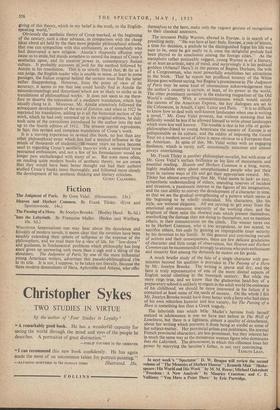Fiction
The Judgment of Paris. By Gore Vidal. (Heinemann. 15s.) Frank Tilsley. (Eyre and The Passing of a Hero. By Jocelyn Bro Into the Labyrinth. By Francoise M 10s. 6d.) WHATEVER lamentations one may hear about the decadence and frivolity of modern novels, it seems clear that the novelists have been steadily extending their sphefe of influence at the expense of the philosophers, and we read them for a view of life, for "low-down" and guidance, in fundamental problems which philosophy has long since given up answering with more than a sigh and a shrug of the shoulders. The Judgment of Paris, by one of the more influential young American writers, advertises this pseudo-philosophical role in its title. It is not, I suppose, to be taken too literally, because the three modern descendants of Hera, Aphrodite and Athena, who offer themselves to the hero, make only the vaguest gesture of recognition to their classical ancestors.
The innocent Philip Warren, abroad in Europe, is in search of a presiding deity. "He was here at last: Italy, Europe, a year of leisure, a time for decision, a prelude to, the distinguished fugue his life was sure to be, once he got really to it, once the delightful prelude had been played to its conclusion among the foreign cities." As the metaphors rather noticeably suggest, young Warren is of a literary, or at least an artistic, turn of mind, and surprisingly it is his political goddess (Athena? Hera?) in the person of Regina Durham, the wife of a Congressman, who most powerfully establishes her attractions in the book. That he rejects her proffered tenancy of the White House goes without saying, but Regina's prominence in The Judgment of Paris may be some kind of unconscious acknowledgement that the author's country is certain, at least, of its power in the world. The other prominent certainty is the enduring magnetism of the Old World's culture. With a conscientiousness which would satisfy the canons of the American Express, the key dialogues are set in the Colosseum, in Amalfi, Capri, Luxor and Paris. "It is so difficult to know how to deal with well-known landscapes when one is writing a novel," Mr. Gore Vidal protests, but without noticing that his difficulty would be less if he allowed himself to write about landscapes which were less well known. The trouble is that in his role of guide- philosopher-friend to young Americans the scenery of Europe is as indispensable as its culture, and the oddity of imposing the Grand Tour on a modern novel of ideas is ruore obvious to a European than an American. In spite of this, Mr. Vidal writes with an engaging freshness, which is rarely nalf, occasionally salacious and almost always entertaining.
Mr. Frank Tilsley is another philosopher-novelist, but with none of Mr. Gore Vidal's surface brilliance or his lists of monuments and essential reading. Heaven and Herbert Common is a long, warm, highly readable story about unsophisticated people who put their trust in various ways of life and get their appropriate reward. Mr. Tilsley has almost everything that Mr. Vidal seems to lack: an easy, sympathetic understanding of others, unending reserves of incident and situation, a passionate interest in the figures of his imagination, and the rare ability to convey the development of a character in time, so that we see the gradual strengthening of a pattern which seems at the beginning to be wholly undecided. His characters, like his style, are without elegance. All are striving to get away from the emotional and economic insecurity of the working class, and the brightest of them seize the shortest cuts which present themselves, overlooking the damage they are doing to themselves, not to mention others, in their concentration on the climb. The winner turns out to be Herbert Common, who is too scrupulous, or too scared, to sacrifice others, but ends by gaining an impregnable inner security by his devotion to his family. In this general and convincing onrush of actions and their consequences, there are few delicate gradations of character and little range of observation, but Heaven and Herbert Common can be recommended strongly to anyone who puts enthusiasm and sincerity first among the demands he' makes on his guide.
A much briefer study of the fate of a single character with pre- tensions beyond his qualities is provided in The Passing of a Hero by Mr. Jocelyn Brooke. The writing is sparse and dry, and the hero is truly representative of one of the more dismal aspects of English social climbing in the twentieth century. But while the story rings true, and we know that the glamorous head-boy of a preparatory school is unlikely to regain in the adult world the eminence of his childhood, we should be more interested in his failure if it contained at least some of the seeds of success. On the whole 1 felt Mr. Jocelyn Brooke would have done better with a hero who had more of his own relentless humour and less vacuity, for The Passing of a Hero is something less than a Greek tragedy.
The labyrinth into which Mlle Mallet's heroine finds herself enticed in adolescence is one we have met before in The Well of Loneliness, but there is a lightness, almost a quality of detachment, about her writing which prevents it from being as sordid as some of her subject-matter. Her provincial artists and politicians, the normal French provincial characters, are less prominent, but they interest her in much the same way as the monstrous woman figure who dominates Into the Labyrinth. The denouement, in which this villainess loses her power by marrying the heroine's father, is not very convincing.
TANGYE LEAN.


































 Previous page
Previous page